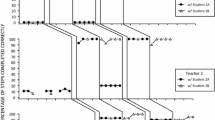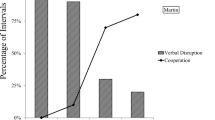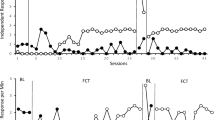Abstract
This study provides a direct comparison of differential reinforcement of other behavior (DRO) and differential reinforcement of alternative behavior (DRA). Participants included three children in center-based classrooms referred for functional assessments due to disruptive classroom behavior. Functional assessments included interviews and brief functional analyses. An alternating treatments design was used to evaluate the relative effectiveness of function-based DRO and DRA interventions. Results indicated that both intervention procedures effectively reduced disruptive behavior, but the DRA procedure consistently resulted in greater reductions in disruptive behavior across all participants. Results are discussed in terms of directions for future functional assessment and intervention research as well as implications for applied practice.


Similar content being viewed by others
References
Anderson, D. R. (1983). Prevalence of behavioral and emotional disturbance and specific problem types in a sample of disadvantaged preschool-aged children. Journal of Clinical Child Psychology, 12, 130–136.
Barkley, R. A. (1998). Attention-deficit hyperactivity disorder: A handbook for diagnosis and treatment (2nd ed.). New York: Guilford Press.
Beare, P. L., Severson, S., & Brandt, P. (2004). The use of a positive procedure to increase engagement on-task and decrease challenging behavior. Behavior Modification, 28(1), 28–44.
Boyajian, A. E., DuPaul, G. J., Handler, M. W., Eckert, T. L., & McGoey, K. E. (2001). The use of classroom based brief functional analyses with preschoolers at risk for attention deficit hyperactivity disorder. School Psychology Review, 30, 278–293.
Campbell, S. B., & Ewing, L. J. (1990). Follow-up of hard-to-manage preschoolers: Adjustment at age 9 and predictors of continuing symptoms. Journal of Child Psychology and Psychiatry, 31, 871–889.
Carr, E. G., & Durand, V. (1985). Reducing behavior problems through functional communication training. Journal of Applied Behavior Analysis, 18, 111–126.
Carr, J. E., Nicolson, A. C., & Higbee, T. S. (2000). Evaluation of a brief multiple-stimulus preference assessment in a naturalistic context. Journal of Applied Behavior Analysis, 33, 353–357.
Carter, D. L., & Horner, R. H. (2007). Adding functional behavioral assessment to first step to success: A case study. Journal of Positive Behavior Interventions, 9, 229–238.
Doggett, R. A., Edwards, R. P., Moore, J. W., Tingstrom, D. H., & Wilczynski, S. M. (2001). An approach to functional assessment in general education classroom settings. School Psychology Review, 30, 313–328.
Doggett, R. A., Mueller, M. A., & Moore, J. W. (2002). Functional assessment informant record for teachers: Creation, evaluation and future research. Proven Practice, 4, 25–30.
Dufrene, B. A., Doggett, R. A., & Henington, C. (2007). Functional assessment and intervention for disruptive classroom behaviors in preschool and head start classrooms. Journal of Behavioral Education, 16(4), 368–388.
Eckert, T. L., Hintze, J. M., & Shapiro, E. S. (1999). Development and refinement of a measure for assessing the acceptability of assessment methods: The assessment rating profile- revised. Canadian Journal of School Psychology, 15(1), 21–42.
Ervin, R. A., Ehrhardt, K. E., & Poling, A. (2001). Functional assessment: Old wine in new bottles. School Psychology Review, 30, 173–179.
Gresham, F. M., McIntyre, L. L., Olson-Tinker, H., Dolstra, L., McLaughlin, V., & Van, M. (2004). Relevance of functional behavioral assessment research for school-based interventions and positive behavioral support. Research in Developmental Disabilities, 25, 19–37.
Konczak, L. J., & Johnson, C. M. (1983). Reducing inappropriate verbalizations in a sheltered workshop through differential reinforcement of other behavior. Education and Training of the Mentally Retarded, 18(2), 120–124.
Lucas, R. L. (2000). The effects of time-out and DRA on the aggressive behavior of a spirited two-year-old. Child and Family Therapy, 22, 2.
Martens, B. K., Witt, J. C., Elliott, S. N., & Darveaux, D. (1985). Teacher judgments concerning the acceptability of school-based interventions. Professional Psychology: Research and Practice, 16, 191–198.
Mazaleski, J. L., Iwata, B. A., Vollmer, T. R., Zarcone, J. R., & Smith, R. G. (1993). Analysis of the reinforcement and extinction components in DRO contingencies with self-injury. Journal of Applied Behavior Analysis, 26(2), 143–156.
McKerchar, P. M., & Thompson, R. H. (2004). A descriptive analysis of potential reinforcement contingencies in the preschool classroom. Journal of Applied Behavior Analysis, 37, 441–444.
Moore, J. W., Doggett, R. A., Edwards, R. P., & Olmi, D. J. (1999). Using functional assessment and teacher-implemented functional analysis outcomes to guide intervention for two students with Attention-Deficit/Hyperactivity Disorder. Proven Practice: Prevention and Remediation Solutions for Schools, 2, 3–9.
Northup, J., Wacker, D., Sasso, G., Steege, M., et al. (1991). A brief functional analysis of aggressive and alternative behavior in an outclinic setting. Journal of Applied Behavior Analysis, 24(3), 509–522.
Petscher, E. S., Rey, C., & Bailey, J. S. (2009). A review of empirical support for differential reinforcement of alternative behavior. Research in Developmental Disabilities, 30, 409–425.
Pierce, E. W., Ewing, L. J., & Campbell, S. B. (1999). Diagnostic status and symptomatic behavior of hard-to-manage preschool children in middle childhood and early adolescence. Journal of Clinical Child Psychology, 28, 44–57.
Repp, A. C., Deitz, S. M., & Speir, N. C. (1974). Reducing stereotypic responding of retarded persons by the differential reinforcement of other behavior. American Journal of Mental Deficiency, 79, 279–284.
Reynolds, G. S. (1961). Behavioral contrast. Journal of the Experimental Analysis of Behavior, 4, 57–71.
Rozenblat, E., Brown, J., Brown, A., Reeve, S., & Reeve, K. (2009). Effects of adjusting DRO schedules on the reduction of stereotypic vocalizations in children with autism. Behavioral Interventions, 24(1), 1–15.
Sugai, G., & Horner, R. (2002). The evolution of discipline practices: School wide positive behavior supports. Child and Family Behavior Therapy, 24, 23–50.
VanDerHeyden, A. M., Witt, J. C., & Gatti, S. (2001). Descriptive assessment method to reduce overall disruptive behavior in a preschool classroom. School Psychology Review, 30, 548–567.
Volmer, T. R., & Iwata, B. A. (1992). Differential reinforcement as treatment for behavior disorders: Procedural and functional variations. Research in Developmental Disabilities, 13, 393–417.
Volmer, T. R., Roane, H. S., Ringdahl, J. E., & Marcus, B. A. (1999). Evaluating treatment challenges with differential reinforcement of alternative behavior. Journal of Applied Behavior Analysis, 32, 9–23.
Von Brock, M. D., & Elliott, S. N. (1987). Influence of treatment effectiveness information on the acceptability of classroom interventions. Journal of School Psychology, 25, 131–144.
Webster-Stratton, C., & Hammond, M. (1998). Conduct problems and level of social competence in head start children: Prevalence, pervasiveness, and associated risk factors. Clinical Child and Family Psychology Review, 1, 101–124.
Webster-Stratton, C., Reid, J., & Hammond, M. (2001). Social skills and problem-solving training for children with early-onset conduct problems: Who benefits? Journal of Child Psychology and Psychiatry, 47, 943–952.
Whitaker, S. (1996). A review of DRO: The influence of the degree of intellectual disability and the frequency of the target behaviour. Journal of Applied Research in Intellectual Disabilities, 9, 61–79.
Wilder, D. A., Harris, C., Reagan, R., & Rasey, A. (2007). Functional analysis and treatment of noncompliance by preschool children. Journal of Applied Behavior Analysis, 41, 173–177.
Author information
Authors and Affiliations
Corresponding author
Rights and permissions
About this article
Cite this article
LeGray, M.W., Dufrene, B.A., Sterling-Turner, H. et al. A Comparison of Function-Based Differential Reinforcement Interventions for Children Engaging in Disruptive Classroom Behavior. J Behav Educ 19, 185–204 (2010). https://doi.org/10.1007/s10864-010-9109-2
Published:
Issue Date:
DOI: https://doi.org/10.1007/s10864-010-9109-2




